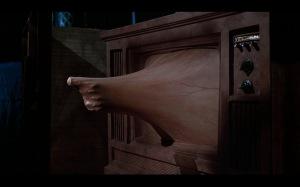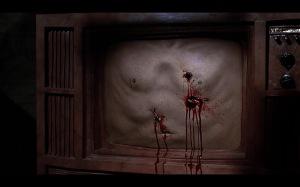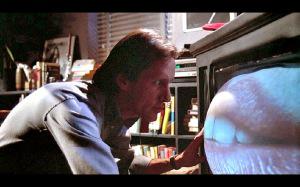Video Word Made Flesh … Where have I heard that before? Oh yeah, the 1983 classic film Videodrome by David Cronenberg! This is mostly an essay on modern science as it pertains to the film’s fictitious premise. If you haven’t seen the film you may wonder: What does Video Word Made Flesh mean? Well, Videodrome may be entering the public consciousness again soon and everyone can run to a theater to find out.

The Gun
Against the many tortured cries of intelligent filmgoers everywhere, a 2011 (perhaps 2012) remake has been slated and announced on IMDB. When I set out to write this article, I was not aware of a remake in the works. The announcement is one in a long line of recent 70s and 80s film remakes, but I felt it was worth reporting here and getting it out of the way up front. There are other rumors of a remake of Cronenberg’s cult classic Scanners. Also, James Woods (who plays Max Renn, the hero of Videodrome) is in a Straw Dogs remake expected to be released September 16th. Okay, back to the essay.

Videodrom TV
While Cronenberg’s Videodrome is a seminal piece of horror genre moviemaking, it is also loaded with philosophical questions for Man’s relationship with reality and technology. These questions haven’t disappeared in the 28 years since Videodrome was first unleashed. However, developments in neuroimaging and cognitive sciences in the past five years have begun to shine specific insights that confirm the same fears that initially excited and disturbed fans of the film.
A quick note on the story for the uninitiated: Videodrome film follows Max Renn (James Woods), the president of a television station called CIVIC-TV. Early on, we learn that Max is able to keep his television business alive on channel 83 with soft-core pornography and hard-core violence. Max’s public one liner is that exposure to his content on TV creates an outlet for people’s natural violent tendencies and serves a great contribution to the community. As the film progresses, Max is exposed to a television program called Videodrome that’s composed of fake murders and torture. He believes he has found the next hot thing and will profit highly from it. Max’s trouble is that not only does he enjoy it a bit too much, but the murders are also real, and (as said in the trailer for the film) Videodrome is, “a bio-electronic addiction. It will shatter your reality. Television can change your mind. Videodrome will change your body.” Anyone who views Videodrome becomes controlled by urges and hallucinations and becomes an assassin for the secret society that created the videos. But how does it work?

Max Renn
Like all good science fiction, it takes technological concepts and stretches them to a hypothetical extreme of possibility and application. The hallucinatory takeover operates under the notion that a brain can be hacked. If experience is information and information is waves, code can be dialed in through TV to alter a human being. The line between the science fact and fiction here becomes very interesting, and it is this line that is at the core of the film’s relevance nearly thirty years later. The following is the science fiction explanation in the film by Professor Brian O’Blivion, who refers to Videodrome as the “Videodrome signal”:

